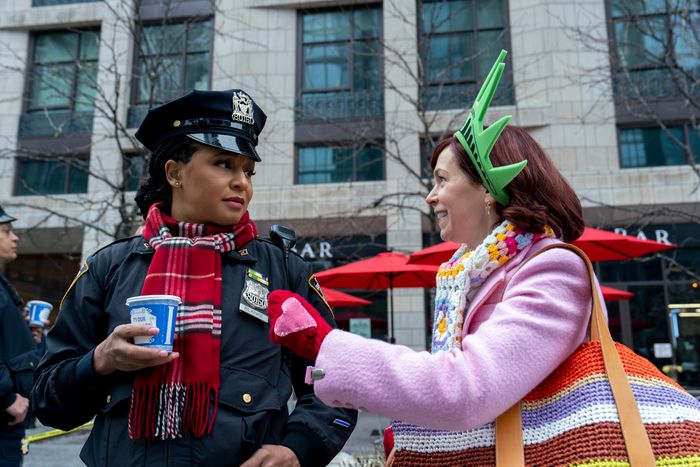
In an early episode of Elsbeth, Jane Krakowski enters a meeting by announcing that she’s “Joann Lennox from Joann Lennox Realty” while throwing her coat across the room, about to face off with a co-op board president played by Linda Lavin. This series of words might sound fairly innocuous, but if you’re familiar with the kind of television written by Robert and Michelle King, it may trigger the same sort of sleeper-agent response it did in me. The Kings — creators of The Good Wife, its spinoff The Good Fight, and Evil — specialize in breezy, high-quality, old-fashioned procedural television. They also specialize in great guest roles for stars of the stage, because their shows happen to film in New York. With Elsbeth, they’ve spun off a character from Chicago-based The Good Wife’s universe, Carrie Preston’s daffy but hyper-observant defense attorney Elsbeth Tascioni, and set her loose on New York City, and the results and the guest stars are as delightful as you might hope.
It’s not just the setting that’s changed, though. While The Good Wife and Fight were legal dramas, Elsbeth shifts into being more of a detective series — like Evil minus the supernatural, though retaining a surreal sense of humor. Elsbeth, once a memorable side character who would stumble through a lawsuit before suddenly revealing an insight, has taken up a job as an impartial observer at the NYPD, coming along to its murder investigations.
Transported into a different genre, Elsbeth now fits the mold of a classic detective type: the quirky but clever purveyor of surprising observations whom suspects underestimate until she unexpectedly traps them — think Columbo and his descendants. The police tend to flub their investigations, while Elsbeth notices things they don’t, with the help of Carra Patterson, playing an overlooked junior officer who bonds with Elsbeth on the job. Wendell Pierce, meanwhile, is the police captain who seems amiable until Elsbeth drops a satisfying hook at the end of the pilot (perhaps a spoiler, but also the premise): She’s actually there to gather evidence on him for a police-corruption investigation. It’s hard to tell, having watched only the first few episodes provided to critics, how well Elsbeth might grapple with the inherent copaganda of the police procedural as a form, but The Good Fight and Evil have established the Kings’ and their writers’ willingness to engage with structural inequality, and, at the very least, introducing Pierce as a potential big bad does provide the show with inherent long-term tension.
The fun of the early episodes, however, comes from the feeling that the Kings and their writers are getting to material they might’ve considered for episodes of the Good universe but had to scrap because those shows weren’t actually set in New York. There’s a murder case at a prestigious Juilliard-like drama school (remember, these are the same writers who once proposed that a famous Broadway producer might be possessed by the devil), as well as cases that involve a thinly veiled Bethenny Frankel character (with Jesse Tyler Ferguson as an ersatz Andy Cohen) and that murder at the co-op featuring Lavin and Krakowski, which gives Only Murders in the Building a run for its money. (Lavin has technically already appeared in the Good Wife universe as a pretrial officer who dealt with Cary Agos, which raises the tantalizing possibility of other Good-universe favorites returning either as themselves or as wholly new characters.) They’ve written Elsbeth as wide-eyed about her new hometown and enthusiastically basic — she really wants tickets to The Lion King — which gives Preston plenty of comedic fodder when going up against the city’s snarkier and more sarcastic denizens. In Elsbeth’s rendering of New York, that happens to be most of the people who live there. Also, most of the people in Elsbeth’s New York have a Drama Desk nomination.
In those adventures through the city, Elsbeth also displays its understanding of a basic tenet of television that can go underappreciated: Dramas can be fun. Too often, network or streaming dramas aim at prestige ponderousness, even when they’re mass-market products. There’s a place for rich, haunting serialized drama when it’s done well, but there’s also a place for spritely, well-written, and entertaining case-of-the-week dramas. The latter is in danger of becoming lost within the wide universe of content, which has a shrinking space for shows like Elsbeth, even though they tend to do well in the libraries of streaming services (see: the Suits resurgence). It requires an underrated level of skill to make a show fizz, and right out of the gate Elsbeth’s got fizz — in other words, it’s got Joann Lennox of Joann Lennox Realty.
More TV Reviews
- Meghan Markle Pioneers New Frontiers in Unrelatability
- Marvel Won’t Let Daredevil: Born Again Live
- We Were Too Hard on Winning Time


